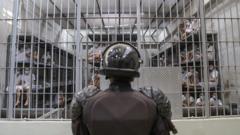As President Trump’s national security team embarks on a whirlwind diplomatic tour of Europe, their hardline message has resonated with astonishment rather than surprise among political leaders. This contrast to Trump’s previous term, which was marked by a more cautious and conciliatory approach, underscores the abrupt shift in U.S. foreign policy that has left European leaders feeling sidelined and apprehensive.
### Trump's New Foreign Policy Strategy Challenges European Alliances

### Trump's New Foreign Policy Strategy Challenges European Alliances
The Trump administration's recent foreign policy approach is creating tensions with European allies while promoting a more aggressive U.S. stance on technology and security.
Vice President JD Vance's arrival in Paris, where he elaborated on America's intention to dominate the artificial intelligence sector, reflects a confident tone—one that has been met with mixed reactions from European nations. He asserted that the U.S. would lead the production of advanced technology, hinting that European countries might need to align with U.S. interests or risk being marginalized.
The conversations surrounding Ukraine have also drawn much concern. Trump’s new Defense Secretary, Pete Hegseth, has taken a controversial stance, suggesting that Ukraine abandon its goal of reclaiming all territories lost to Russia. This position was alarming to European leaders, particularly as it was coupled with Trump's behind-the-scenes communications with Russian President Vladimir Putin, which included a concession of territory already occupied by Russia and assurances that Ukraine would not join NATO.
Such unilateral moves have left Ukrainian President Volodymyr Zelensky and European leaders feeling sidelined in discussions that have direct implications for their security and territorial integrity. The reactions from Europe have been cautious yet firm, as leaders look to navigate the new landscape without inciting further displeasure from the Trump administration.
This evolving dynamic highlights the potential for increasing fissures within NATO and the broader Western alliance, as European countries respond to an assertive U.S. policy shift that demands their recalibration not only in matters of defense but also economic cooperation. The conversations unfolding at the annual security conference in Munich will likely determine how well Western allies can maintain a unified front in this new geopolitical climate.
In sum, President Trump’s administration presents a new and aggressive approach to foreign policy that is shaking the foundations of existing alliances, particularly in Europe, and challenging long-held diplomatic norms.
The conversations surrounding Ukraine have also drawn much concern. Trump’s new Defense Secretary, Pete Hegseth, has taken a controversial stance, suggesting that Ukraine abandon its goal of reclaiming all territories lost to Russia. This position was alarming to European leaders, particularly as it was coupled with Trump's behind-the-scenes communications with Russian President Vladimir Putin, which included a concession of territory already occupied by Russia and assurances that Ukraine would not join NATO.
Such unilateral moves have left Ukrainian President Volodymyr Zelensky and European leaders feeling sidelined in discussions that have direct implications for their security and territorial integrity. The reactions from Europe have been cautious yet firm, as leaders look to navigate the new landscape without inciting further displeasure from the Trump administration.
This evolving dynamic highlights the potential for increasing fissures within NATO and the broader Western alliance, as European countries respond to an assertive U.S. policy shift that demands their recalibration not only in matters of defense but also economic cooperation. The conversations unfolding at the annual security conference in Munich will likely determine how well Western allies can maintain a unified front in this new geopolitical climate.
In sum, President Trump’s administration presents a new and aggressive approach to foreign policy that is shaking the foundations of existing alliances, particularly in Europe, and challenging long-held diplomatic norms.





















